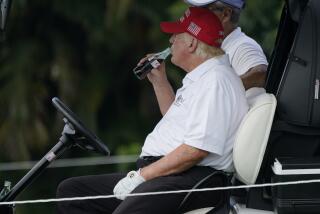Clinton, Gingrich Drug Plan Hits the Air
- Share via
WASHINGTON — In a rare meeting of the minds, President Clinton and House Speaker Newt Gingrich (R-Ga.) on Thursday jointly launched an unprecedented nationwide media campaign to discourage teenagers from using drugs.
Announced in Atlanta, the campaign--which began with advertisements in 75 morning newspapers and spots on all four networks Thursday night--is budgeted at $2 billion over five years.
Though the bulk of the effort will focus on television, ads produced free by some of Madison Avenue’s premiere agencies also will run on the radio, billboards and the Internet.
But some drug policy experts challenged the campaign’s effectiveness.
“There’s remarkably little evidence that it will work,” said Ethan Nadelmann, director of the Lindesmith Center Drug Policy Research Institute in New York. “If we’re going to spend billions of dollars, let’s spend it on things that will make more of a difference.”
Nadelmann argued that providing drug treatment and alternate activities for youngsters would be a more savvy, if less flashy, approach.
Lawrence Wallack, a professor of public health at UC Berkeley, termed the campaign “kind of like agreeing on the least common denominator and saying, because we agree on it, therefore it is a good thing. It’s the kind of strategy that makes everyone feel like something is being done on the problem. . . . Everybody is happy, but it is just not sufficient to have an impact on the problem.”
Wallack--who advocates more mentoring programs and activities to help teenagers deal with a wide array of public health problems, from drugs to early pregnancies--agreed that the campaign will increase awareness of the drug problem. This is a good first step, he said, but it is not a solution.
He also criticized the effort for not targeting cigarette and alcohol use among teens.
The antidrug media campaign has been underway since January in 12 pilot cities in response to concern over the steady increase of drug use by youths in recent years.
One shows a girl wielding a frying pan--wildly smashing it into things and then pausing to tell the audience that is what drugs do to your brain. Another pictures a child recounting her mother’s warnings not to play with matches. But, asked whether her mother warned her about drugs, she says nothing.
“These ads are designed to knock America upside the head and get America’s attention,” Clinton said in Atlanta, where he was joined by Gingrich.
Drawing on his personal experience, Clinton referred to the drug problems that once plagued his half-brother, Roger Clinton, and stressed that the message of the ads is for everyone.
“My brother nearly died from a cocaine habit, and I’ve asked myself a thousand times: What kind of fool was I that I did not know that this was going on?” the president said. “How did this happen that I didn’t see this coming and didn’t stop it?”
And he added: “Nobody in America is free of this--not the president, not any community, any school, any church, any neighborhood.”
The advertising blitz, crafted by the White House Office of National Drug Control Policy in conjunction with the Partnership for a Drug-Free America, will be funded half through federal dollars and half through donated air time and advertising space from media outlets.
Although Congress so far has allocated funds only for the first year of the project, Gingrich said the rest of the money will be found.
“We are all trying to reach out to every young American and say: Don’t do it,” Gingrich said.
Although public health advocates suggested that the campaign’s funds would be better invested in programs targeting teenagers, some congressional Republicans said the money should be spent on more aggressive interdiction of drugs.
Sen. Paul Coverdell (R-Ga.) attacked the ad campaign as “inexcusably and dangerously weak.”
“By slashing budgets for interdiction and border protection, this president has rendered our nation unable to fight--let alone win--this terrible drug war,” Coverdell said.
More to Read
Sign up for Essential California
The most important California stories and recommendations in your inbox every morning.
You may occasionally receive promotional content from the Los Angeles Times.













